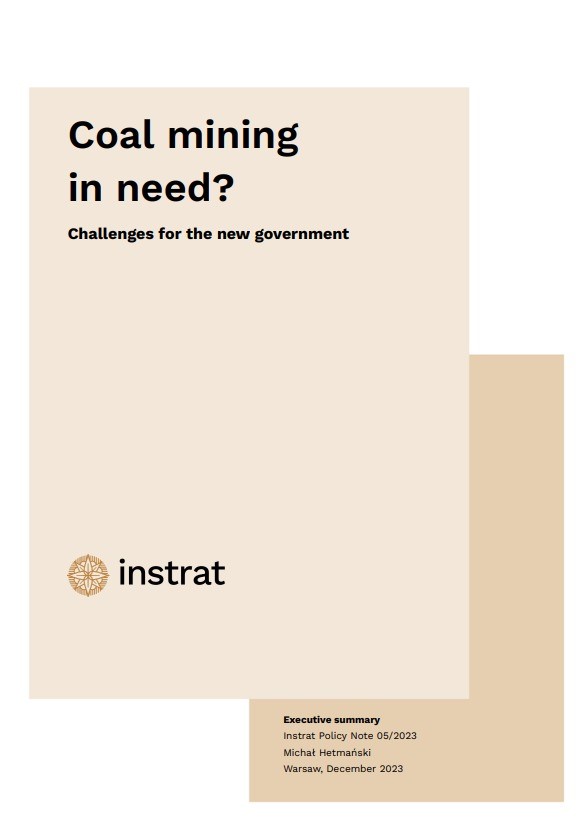The government of Mateusz Morawiecki has planned to bail out coal mining companies with 1.5 billion EUR (7 billion PLN) at the last hurdle, even though they had a stable second year with record financial results. Michał Hetmański, the CEO of think tank Instrat, is calling on the new government to halt this payment and divert funds towards a just transition.
Financial mess in the mining industry
The outgoing government leaves behind an unclear situation in the coal mining industry. Despite its very good financial stance, it planned to utilise two existing channels for state aid support to the sector.
Thermal coal producers, Polish Mining Group (Polska Grupa Górnicza, PGG), Tauron Wydobycie, and Węglokoks Kraj are supposed to receive an already second, largest tranche of illegal state aid from the government state program for ‘coal mining output reduction’ launched in late 2021. In 2022 alone, those companies earned approx. Despite receiving 1 billion EUR (EBITDA) and around one-third of this sum from the government scheme.
In the first three quarters of 2023, Instrat estimates these earnings to equal 1 billion EUR (EBITDA). Despite that, the outgoing government wanted to bail them out with a second tranche worth 1.5 billion EUR (7 billion PLN). Instrat calls for halting this payment as the program still has not received consent from the European Commission (DG COMP) due to a lack of clarity and a manageable plan to quit coal.
On top of that, the Ministry of State Assets submitted a draft bill at the end of November 2023 amending the Act on the functioning of the hard coal mining industry, proposing again to defer re-payments of the 2021 pandemic-linked support. Coal mining companies (PGG, Tauron Wydobycie, Węglokoks Kraj) owe approx. 400 million EUR (1.9 billion PLN) to the Polish Development Fund and the Social Insurance Institution (ZUS).
“It should be noted that since the beginning of the 2022 energy crisis, the thermal coal mining sector, including PGG, could regulate its financial obligations, and no support from the government’s mining reduction subsidy programme was necessary. Despite this, the mines are expecting another tranche of illegal state aid, as Brussels has so far decided not to issue a positive notification assessment for the government’s programme,” – Hetmanski discusses.
Michał Hetmański, Instrat’s CEO, who authored the new study reviewing the financial stance of coal mining companies, calls for an audit of their books and halting further support until the situation gets clear. “The first tranche of the so-called coal mining output reduction scheme was already illegal, and this program needs a major revision. This program is full of paradoxes – its name suggests mining output reduction, although some mines were supposed to increase production instead of decreasing. It lacks simple logic”.
Treasury bonds instead of cash
The outgoing government planned to transfer around 1.5 billion EUR (7 billion PLN) to three companies in 2023. On the 8th of December, a Radio Zet journalist, Mariusz Gierwszewski, reported that the Law and Justice government decided to issue treasury bonds to be transferred to mining companies. On the Ministry of Finance website, we read that such an issue of PLN 4-8 billion was set to be carried out between 12-14 December 2023. As of Friday, December 15th, it is unclear whether the new government halted the payment.
Why does the government not simply send cash but issues treasury bonds? Michał Hetmański explains: “The share capital increase of the mining companies in the form of treasury bonds transfer can take place by the finance minister’s decision at the request of his counterpart in the Ministry of State Assets. In this regard, there is no need for a budget amendment or even a ministerial decree. It is worth noting that such management of public funds does not count in the public deficit spending. The Supreme Audit Office assessed this mechanism as incompliant with the Polish Constitution.”
What will the new government do with the hot potato?
Instrat recommends that the new government reviews coal companies’ liabilities and current financial performance before deciding whether to support the sector. Considering the lack of clear and planned focus on output reduction in Poland, diverting money to a fair transition, first and foremost to the employees and not to the mines, could significantly support Poland’s energy transition and renewable energy targets.
Instrat estimates in its new energy modelling study with a 2040 horizon that coal demand in Poland could more than halve by 2030 to ca. 15 million tons of thermal coal, whereas the government and mining industry planned so far to produce approx. two times more coal than needed.
Most significantly, possible support for the mining industry must respect European and national state aid rules and constitutional principles enshrined in Article 219 regarding state budget planning and public deficit rules.
Michał Hetmański comments on the attempt to support mines in the last moments of the government: “I appeal to the leadership of the ministries in charge of finance and coal mining that are taking over the reins of government. We must put a stop to this illegal tranche of funding for mines. It is necessary to sit together and collaborate closely with social partners to avoid a situation in which pointless funding will not support the workers during the energy transition. As people are put on the forefront of the energy transition, it is also important to support employees (i.e., miners), not the financially stable mining companies.”
Contact
Michał Hetmański, CEO & Co-founder at Instrat, michal.hetmanski@instrat.pl


